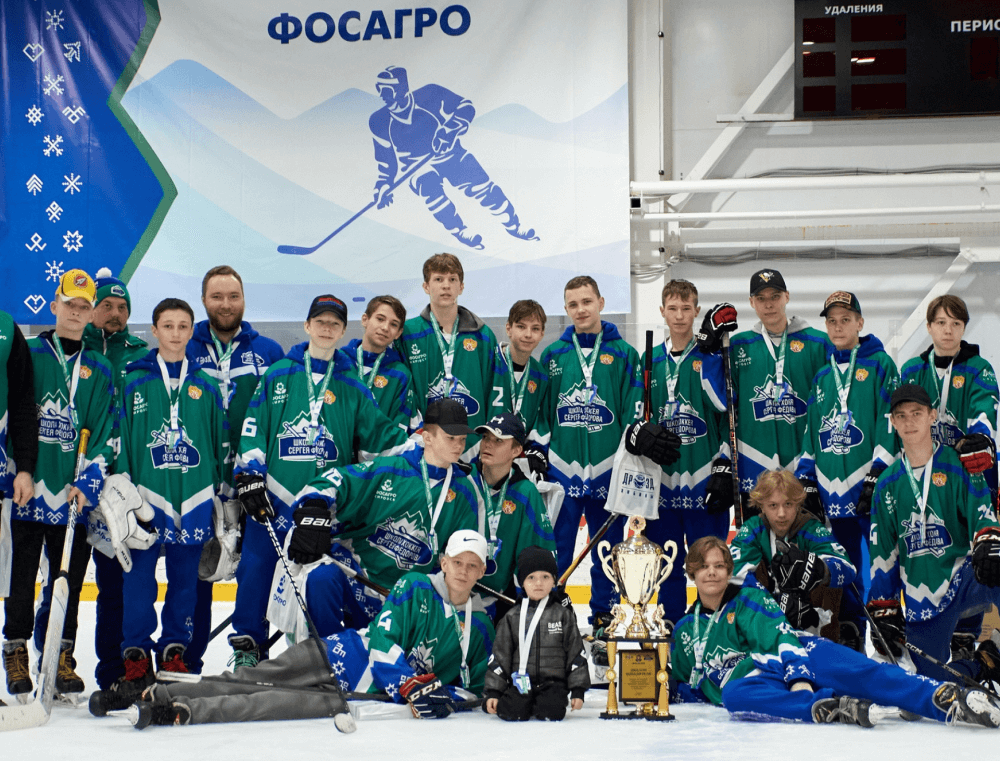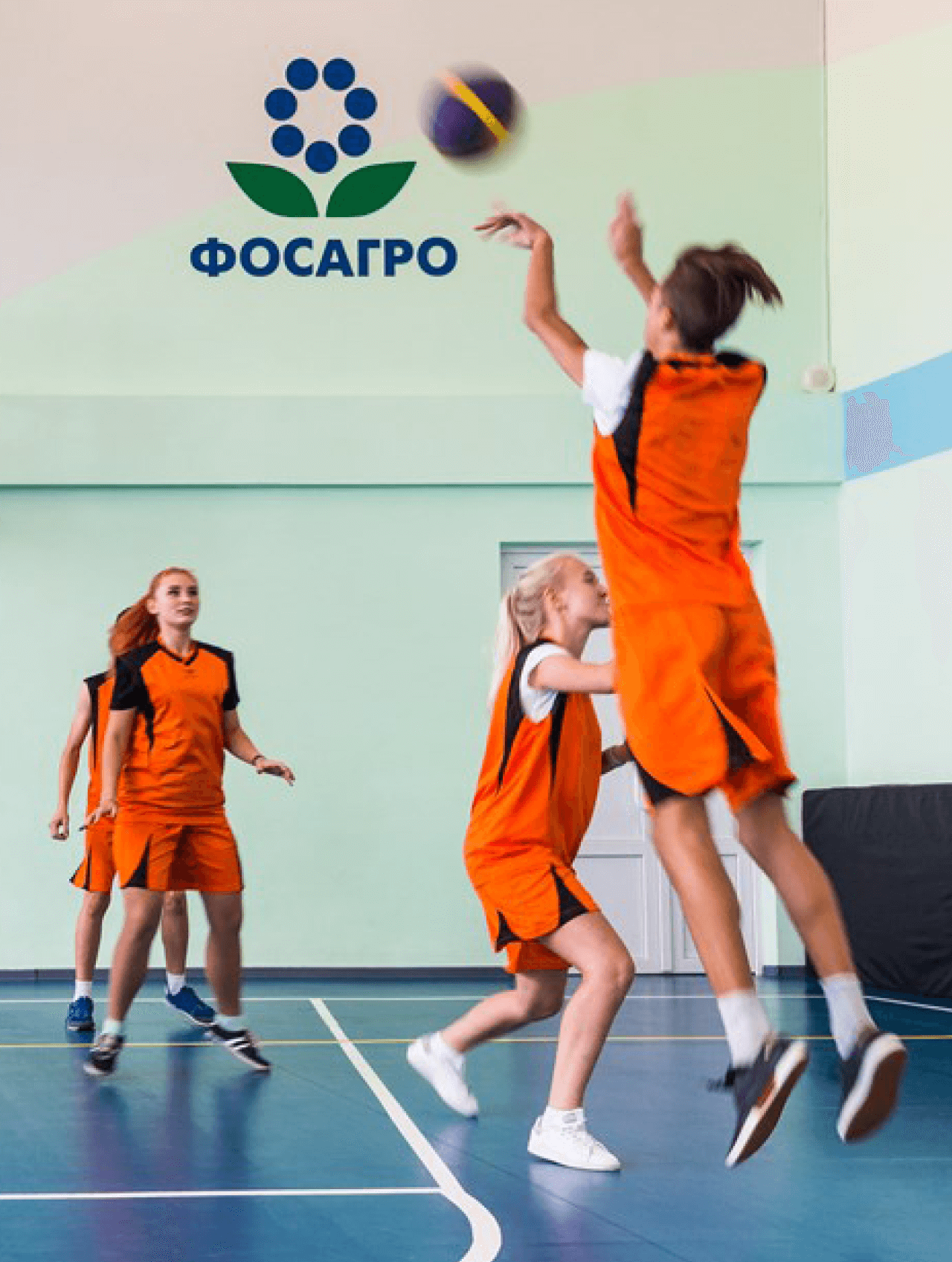Contributing to local communities
AREA, STRATEGIC GOALS AND HIGHLIGHTS OF 2023
Targets
8.3, 9.1, 11.3 and 17.17
Improving the quality of urban environment and promoting sustainable development of the cities where we operate: Kirovsk, Cherepovets, Balakovo, and Volkhov
Target 3.4 and 4.4
Attracting educated, motivated and skilled young talent to innovative Russian facilities, including those of PhosAgro Group
Effective combination of high‑quality education and physical training to facilitate moral and ethical development and promote health of the younger generation
Target 3.4
Preservation and promotion of orthodox values, spiritual ideas, respect for our legacy and motherland, and benevolence
Reconstruction of the Church of the Vernicle Image of the Saviour commenced in Kirovsk
Target 4.4 and 3.4
Preserving the history of the nation, industry, or facility for all generations; supporting continuity of generations, inclusive traditions, respect for the older generation, veterans, and vulnerable population groups
Target 3.4
Supporting Russian sports at the international, national and regional levels, and promoting sports in regions where the Group operates

Our strategy is focused on long‑term social and economic development programmes in the regions, cities, towns and rural communities in which our key production units operate.
We place a high priority on historical continuity: as a successful enduring partner of local communities in which we operate, we are committed to promoting their sustainable development. While hinging upon long‑established social responsibility practices implemented by our production facilities, this partnership is perfectly tailored to meet today’s challenges and relevant stakeholder expectations.
The Company’s Policy for Managing Community Social Programmes (new version approved in December 2022) sets out the following areas as primary targets for social investments
- unlocking the social and economic potential in the regions of operation, enhancing their environmental resilience;
- improving the living standards of employees, their families, PhosAgro veterans and local communities;
- supporting culture;
- strengthening corporate culture through employee engagement in socially significant projects;
- offering career guidance for school and university students;
- enhancing the Company’s reputation as a socially responsible business;
- promoting advanced corporate social responsibility standards.
All our programmes and initiatives involving social investments are aligned with the goals and objectives set in the Group’s Strategy to 2025 and contribute to its successful implementation.
PhosAgro Group achieved the highest distinction at the Responsible Business Leadership national award, emerging as the winner in the majority of categories:
- Educated and Healthy Children of Russia (DROZD), PhosAgro’s sports and educational programme, came first in the Contribution to Strategic Social Objectives nomination;
- Our Favourite Cities, PhosAgro’s social initiative, became the winner in the Contribution to Regional Sustainable Development nomination;
- PhosAgro’s educational programme got the top prize in the Contribution to Strategic Human Capital Objectives nomination.
In 2023, PhosAgro Group once again ranked among businesses with the best social and charitable programmes in the Russian Leaders in Corporate Philanthropy competition. These long‑standing awards for socially responsible businesses are organised by the Donors Forum, a coalition of major grantmakers in Russia. 15 Russian companies made it to the A+ Leaders category, while PhosAgro was the only mineral fertilizer producer to do so.
The Volkhov branch ranked second in the Wellness Culture Development nomination among more than 70 projects participating in the nationwide contest – Investing in the Development of a Healthy Country. Best Corporate Practices.
We implement regional development projects with a special focus on:
Our social investment programmes are based on public benefit priorities and mostly rely on opportunities to partner with regional and local government authorities, local communities, non‑governmental organisations, including non‑profit organisations established by the Company to this end, educational institutions and other stakeholders.
We implement our social investment strategy through promoting efficient and successful cooperation with a broad range of partners in line with the highest international sustainable development standards.
For more information on community social programmes, please visit the Company’s website.

Key policies and regulations
All of the Group’s social investment projects and initiatives are implemented in accordance with the requirements of the Federal Law on Charitable Activities and Charitable Organisations, and other applicable laws and regulations. To ensure transparent and effective corporate governance, the Group has developed a framework of internal regulations governing social programmes, including:
Performance assessment and feedback
The Regulations on Managing Community Social Programmes formalise the appointment of an officer responsible for the implementation and monitoring of a community social programme on the part of Apatit, and set out the procedure for creating a programme passport to describe the material aspects of each programme.
The Regulations also establish a framework of internal controls entrusted to the Commission for Social Issues and Charity (drafting of proposals on assessment criteria), social programme administrator (control over progress against initiatives and assessment criteria, preparation of reports) and Office for Community Social Projects (organisation of internal and external performance evaluations)
The key principle underlying our interaction with local communities is a meaningful dialogue through a variety of communication channels, from public hearings and the involvement of Company representatives in the work of local legislative and representative bodies and government authorities to setting up community liaison offices and other venues for meetings with people.
We also collect a considerable amount of data used for analysing the effectiveness of our social investment programmes from ongoing stakeholder feedback.
For more information, see clause 4 of the Regulations
To collect feedback on the quality and efficiency of community social programmes, the Company organises annual employee surveys and distributes questionnaires among the participants who are not PhosAgro’s employees. Once every two years regions of operation host public presentations of community social projects. These events are attended by project beneficiaries and used to poll local residents.
Also, the Company’s employees have been elected to various regional and local legislative bodies. Our work in these bodies provides us with information on the most urgent issues faced by local authorities. We include them in the agenda of joint working groups which discuss the methods and mechanisms for addressing the issues.
Monitoring and performance assessment are the crucial elements of the social project management framework. Assessment criteria include both objective data and stakeholder views, thus ensuring comprehensive performance assessment and monitoring of the evolution of public priorities related to social and economic development. In 2021, third‑party experts from Donors Forum completed an audit of the Company’s social investments. Based on the audit findings, in 2022 PhosAgro reviewed some of its internal documents, while also developing and approving assessment criteria and procedures for community social programmes. The sets of criteria for each programme are available on the Company’s website. The monitoring and performance assessment procedures were approved by the relevant Regulations.
Stakeholders feedback channels:
Annually, PhosAgro Group takes the following measures to monitor and assess social investment programmes:
- financial and non‑financial audits by external experts;
- employee surveys;
- questionnaire‑based surveys for participants who are not employees of the Company;
- monitoring and performance assessment against the approved criteria;
ID 51149eb5952283f0f4df8951520b395d отсутствует в базе>
Once every two years regions of operation host public presentations of community social projects; these events are attended by project beneficiaries and used to poll local residents; once every five years the Company conducts expert review of the regulations governing respective programmes, with necessary adjustments made based on the review results.
From time to time, external experts are engaged to contribute to the social investment management framework. For example, at the end of 2021 Donors Forum completed external audit of community social investment programmes.
Our social investment objectives are affected, among other things, by the following strategic risks:
for more information, see the Strategic Risks section
Social investment specific risks include:
PhosAgro Group makes an extensive and diverse contribution to the social and economic development of local communities in the regions of operation: we pay taxes to local budgets, create stable and well‑paid jobs for local people, and place regular orders with local businesses. As a responsible long‑term partner, we also allocate significant funds to support local communities, contribute to charitable causes and develop infrastructure. Stable and successful home regions are a key driver of PhosAgro Group’s sustainable development.

Improving the quality of urban environment and promoting sustainable development of the cities where we operate: Kirovsk of Apatit, Cherepovets, Balakovo, and Volkhov.
This programme seeks to create comfortable conditions for comprehensive personal development, with its target audience including both employees of PhosAgro Group and communities residing in the regions of operation. By providing physical resources for building social capital and promoting commitment to healthy lifestyle, the Company assists regional and local authorities in ensuring harmonious and balanced social development, and offering high quality of life comparable to living standards in large cities or even surpassing them in terms of accessibility for an average resident.
Partnership and ongoing meaningful dialogue with stakeholders allow us to fine‑tune our social programmes to better align them with focuses of regional development and invest more efficiently. As regional authorities are well aware of the most pressing needs their regions face, they are engaged through mutual agreements to coordinate joint programmes for industrial and economic development, education, culture, sports, support of local communities, etc. This ensures efficient and systemic utilisation of funds allocated by the Company to address social challenges.
The outcomes and effectiveness of the programme, and its impact on socially significant issues are reviewed in line with the methodology and procedures approved by the Regulations and benchmarked against assessment criteria set for each focus area on an individual basis. These criteria are listed below.
According to a sociological survey conducted in the reporting year and feedback collected in social networks, residents of the Vologda, Saratov, Leningrad and Murmansk regions are generally satisfied with urban improvements currently taking place in these regions.
Vologda region
In 2023, the Vologda region had 26 social facilities (schools, kindergartens, hospitals, museums, churches, etc.) renovated and 8 public spaces (including parks, public gardens and courtyards) landscaped as part of Our Favourite Cities programme. Additionally, assistance was provided to 31 non‑profit organisations (charitable foundations, public organisations for disabled people and veterans, etc.).
Comments of city residents regarding the need to maintain improved areas in due state are taken into account when creating PhosAgro Group’s municipal and charitable initiatives.
Saratov region
In 2023, Our Favourite Cities programme in the Balakovo municipal district of the Saratov region focused on the renovation and improvement of several dozen facilities, including parks, public gardens, sports grounds, roads, parking lots, sidewalks, etc. Significant attention was paid to the installation of lighting and video surveillance systems. Additionally, the Company entered into co‑financing arrangements with local authorities to beautify 12 public spaces in six villages: Bykov Otrog, Malaya Bykovka, Yelanka, Mayanga, Kormezhka, and Maloperekopnoye.
As a result, Balakovo won prizes in several nominations of a regional landscaping competition and was recognised the most well‑maintained city of the Saratov region.
Leningrad region
In 2023, the Leningrad region had 14 facilities and public spaces renovated and landscaped as part of Our Favourite Cities programme.
Additionally, the Volkhov branch organised a series of events to address the pressing social issues of Volkhov. One of the most successful events was the Cultural Cat festival, which featured fundraising and food donation initiatives for helping animals, discussions with veterinarians, a drawing contest, and many more.
More than 100 people participated in a campaign launched by the Company to clean up the banks of the Volkhov River, a crucial waterway of the region.
Murmansk region
In 2023, the Murmansk region had 18 social facilities (schools, kindergartens, hospitals, museums, churches, etc.) renovated and 35 public spaces (including parks, public gardens and courtyards) landscaped as part of Our Favourite Cities programme. Additionally, assistance was provided to 37 non‑profit organisations (charitable foundations and public organisations for disabled people and veterans).
The Company traditionally supports a range of initiatives aimed at promoting entrepreneurship in the regions of operation, as it is fully aware of the positive impacts it has on the economic activity, employment market and well‑being of respective regions.

Healthy, educated and professionally trained population is a critical driver of any region’s social appeal and investment case. Since its establishment, PhosAgro Group has been deeply involved in the development of human potential in the regions of its operation, in particular, by helping to address the outflow of young people from small towns.
School–College/University–Facility educational model
As part of our unique multi‑stage education support programme along the school–college/university–enterprise pathway, we implement career guidance projects for schoolchildren. In the field of personnel training, we cooperate with educational institutions in the cities and towns where we operate, as well as in Moscow, St Petersburg, Ivanovo, Kazan and more.
PhosAgro’s educational model is a good example of consistent progress on a personnel training strategy, which covers all levels of education. It also illustrates a convincing picture of alignment between the Company’s goals and government priorities.
PhosAgro Schools
The first stage of the school–college/university–facility career guidance model operates across six educational entities based in five cities: Volkhov, Balakovo, Apatity, Kirovsk, and Cherepovets, where 360 teachers educate more than 6,000 students.
Beyond financial support for school infrastructure and refurbishment, the initiative facilitates the advancement of natural sciences, economics, and management studies. It champions career guidance initiatives and pursues ventures designed to instil a corporate ethos, leadership acumen, and personal competencies that mirror the Company’s principles – spirituality, ethics, leadership, reliability, safety, teamwork, continuous improvement, and innovation. Furthermore, there is a retraining and incentive framework in place for the teachers and administrators of these institutions.
PhosAgro organises educational tours annually during the summer months for all PhosAgro Classes students to visit production sites and specialised educational organisations. It also holds team‑building events and offers elective courses in physics, chemistry, and maths.
Since 2013, the Company has invested a total of over RUB 6 bnl in the programme.
PhosAgro Schools not only develop educational and research auditoria and labs, but also implement career guidance projects to introduce the Company and its corporate culture to students, teachers, and parents.
Since 2019, 126 participants of the PhosAgro Classes programme who graduated from dedicated universities have been hired by PhosAgro units, including 43 in 2023, to take engineering positions. More than 30 graduates of PhosAgro Classes are expected to be employed by the Company in 2024, with over 100 more by 2026.
More than 100 graduates of 2023 have been admitted to higher educational institutions, with St Petersburg Mining University enjoying the highest popularity among them (25 students). Since 2015, over 1,000 graduates of PhosAgro Classes have been enrolled in higher educational institutions, with technical careers gaining more traction among them every year.
In September 2023, 146 new students started their 10th grade programme at PhosAgro Classes, marking the eleventh admission round since the project launch.
Surveys in 2023 pointed to a rise in positive feedback from parents and students on PhosAgro Classes. Notably, satisfaction with the standard of teaching saw an increase of 4 p.p., bringing it to 94%. An important fact is that more than 50% of PhosAgro Classes students who took part in the survey appreciated the quality and level of equipment.

College/university
At the next stage, we provide the country’s leading technical universities with funds for equipment and supplies and participate in adapting educational programmes to the needs of modern production facilities. Students of PhosAgro Group’s partner vocational schools and universities are offered internships at the Group’s facilities, and the most promising students get employment opportunities.
The Company lays a significant emphasis on advancing secondary vocational education, consistently engaging with educational institutions in the regions of operation, including:
- Kirovsk branch of Murmansk Arctic State University (Murmansk region);
- Cherepovets College of Chemistry and Technology.
In 2023, around 167 students were trained for and received some of the key blue‑collar jobs at the Company.
PhosAgro also supports a Training Centre at the Cherepovets College of Chemistry and Technology that offers express programmes in chemistry and associated fields to nurture talent for most in‑demand jobs.
In 2023, the college again took part in Professionalism, a federal project set to “reload” vocational education. PhosAgro is providing financial support for an internship‑focused training programme for the professions: Inorganic Production Operator and Installation, Maintenance, and Operation of Industrial Equipment. In 2023, 75 students were admitted to the project.
Cooperation with universities as part of the school–college/university–facility educational model serves to fill the most relevant jobs by attracting and retaining talented graduates. Today, the Company actively collaborates with 24 universities that offer courses relevant to its core activities to provide high‑quality and affordable education and support research.
Our collaboration with technical colleges covers:
We have cooperation agreements and roadmaps with many universities.
PhosAgro‑START programme
One of PhosAgro’s pivotal collaborative efforts with higher education establishments is the recruitment of university graduates through the PhosAgro‑START corporate programme, previously known as High‑Potential Graduates. This programme, bolstered by an 11‑year synergy with academic institutions, is tailored to foster closer contacts with graduates, build a talent pool for key positions within the Company and identify career paths for capable young professionals eager to work for the Company. Within this framework, PhosAgro offers young talents comprehensive professional development, hands‑on training, and nurtures their personal and leadership competencies via corporate training sessions, workshops, and project presentations, all under the supervision of seasoned mentors.
Those enrolled in the programme enjoy competitive remunerations, assistance with relocation and settling in their new environment, and are offered accommodation. Additionally, every young professional is partnered with a well‑versed mentor colleague.
To prepare future leaders and establish a pool of internal experts, programme participants are categorised into two development pathways:
- the Leader career track concentrates on honing managerial and cross‑functional competencies;
- the Expert career track focuses on specialising in a specific domain to enhance expertise and skills.
In 2023, 54 young professionals were recruited by the Group’s entities.
This brings the total number of graduates who have joined the Company since the launch of the university engagement programme to 620 people. 416 of these employees are still with PhosAgro today, pursuing careers in such areas as mineralogy, geology, hydraulic engineering, chemistry, thermal energy and electricity generation, rail transport, open‑pit and underground mining, and mine surveying.
Of the programme participants still employed at PhosAgro as at December 2023, over 47% had received promotions and had been included in our talent pool, and many of them had successfully completed the projects assigned to them upon recruitment.
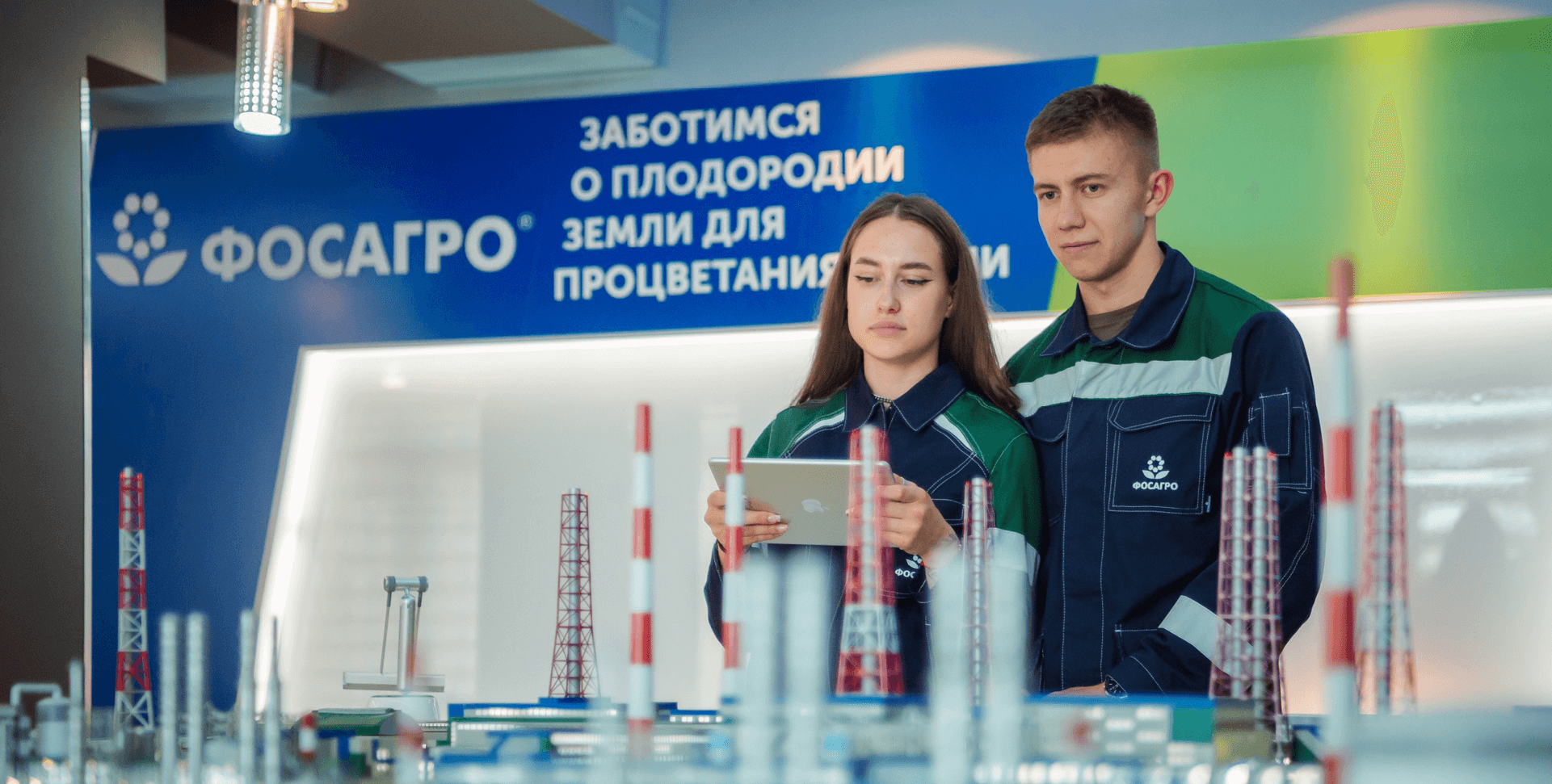
Project of cooperation with Russian agricultural universities
At PhosAgro, we believe that the development of education in the agribusiness sector is a crucial factor in supporting and enhancing the robust growth that Russian agriculture has been delivering in recent years. We are focused on fostering the right conditions for that by developing professional competencies of students and teachers at agricultural universities, as well as of agricultural producers and agro‑industrial technology service providers.
The creation of educational infrastructure is of paramount importance, and it is only achievable with the commitment of engaged businesses. In line with this vision, Timiryazev Agricultural Academy has established the first flagship multifunctional centre, setting the stage for an educational network of 17 regional agrarian universities. Looking ahead to 2024–2025, we project to integrate PhosAgro Group’s educational initiatives into 57 Russian agrarian universities, and to give life to another eight educational centres.
In 2024, we anticipate offering a total of 500 lectures that delve into various aspects of agricultural production, business, and environmental stewardship, encompassing topics like rational and responsible agricultural practices, production processes, food security, and other sustainable development domains. A selection of these lectures is set to evolve into 15 additional professional education courses, culminating in the awarding of both personal PhosAgro certificates and official state qualifications.
A contemporary agricultural university is much more than a hub for theoretical education; it also serves as an incubator for pioneering new technologies. Recognising this, the Company is dedicated to nurturing digital education platforms. Our initial stride in this direction has been the introduction of Pro Agro Lectorium, an online digital educational platform that grants unrestricted access to free agronomic lectures..
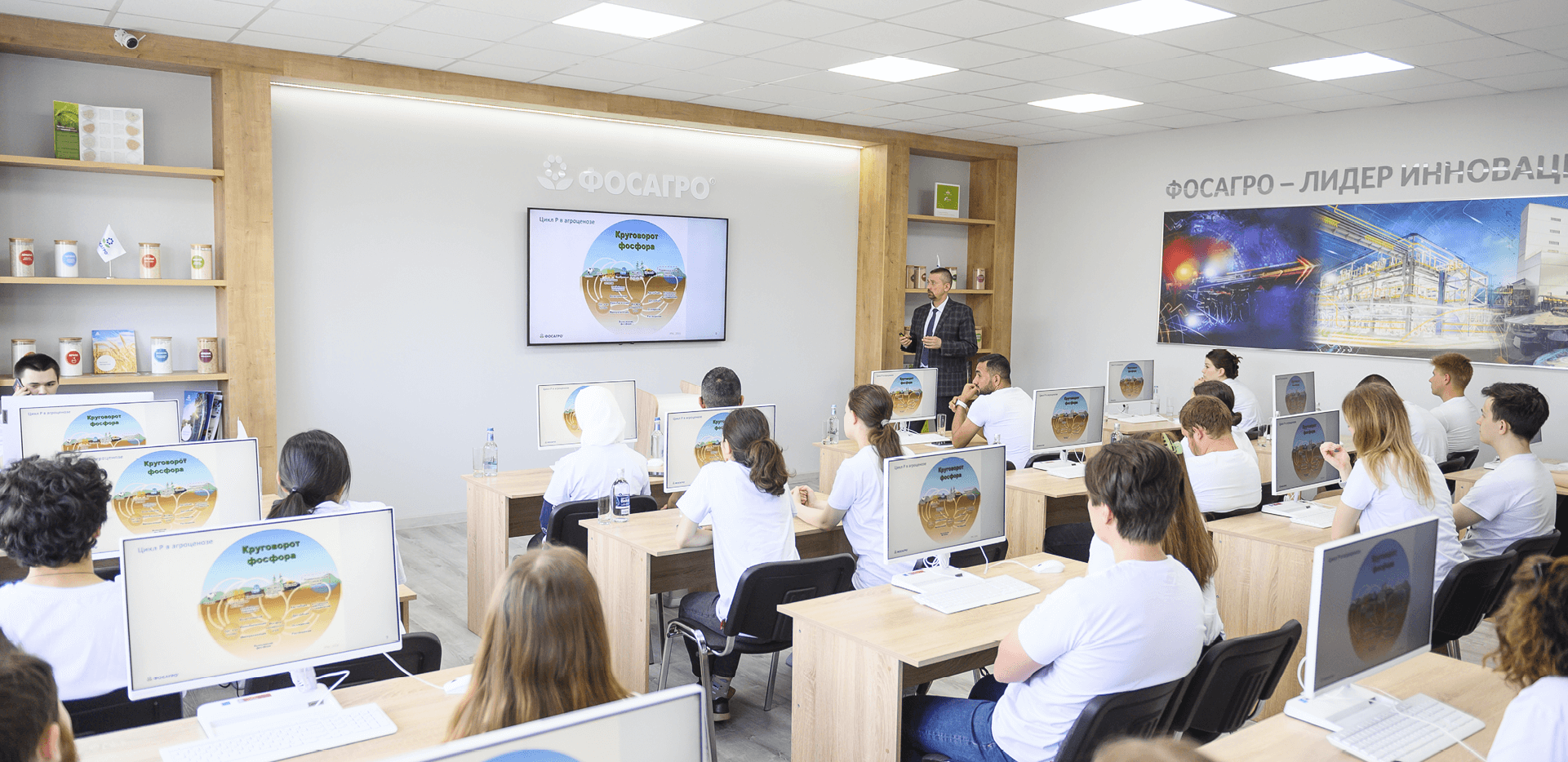
DROZD (Educated and Healthy Children of Russia)
DROZD (Educated and Healthy Children of Russia) is the Company’s key social project aimed at a balanced development of young people in the cities where we operate.
The project is a comprehensive system of multi‑faceted long‑term interactions with children aged 4 to 18 that harmoniously combines sports, spiritual, and patriotic education. To facilitate the DROZD programme, operators (independent non‑profit organisations) have been established in five cities where the Group operates: DROZD‑Balakovo (Saratov region), DROZD‑Cherepovets (Vologda region), DROZD‑Khibiny (Murmansk region) and DROZD‑Volkhov (Leningrad region). 2023 marks the 20th anniversary of the DROZD programme.
Media actively spotlight DROZD’s endeavours:
- in local and corporate newspapers and e‑publications;
- in regional and national media outlets;
- in social networks and partner communities that post information about DROZD’s member organisations and events.
Nevertheless, DROZD collaborates with social service centres, crisis centres, and homes for children without parental care, integrating their involvement into the programme’s initiatives.
An important feature of the project is continuous children’s health monitoring based on the Health Navigator methodology. It helps teachers and parents to adapt educational activities as closely as possible to specific requirements of a child’s body.
Health monitoring
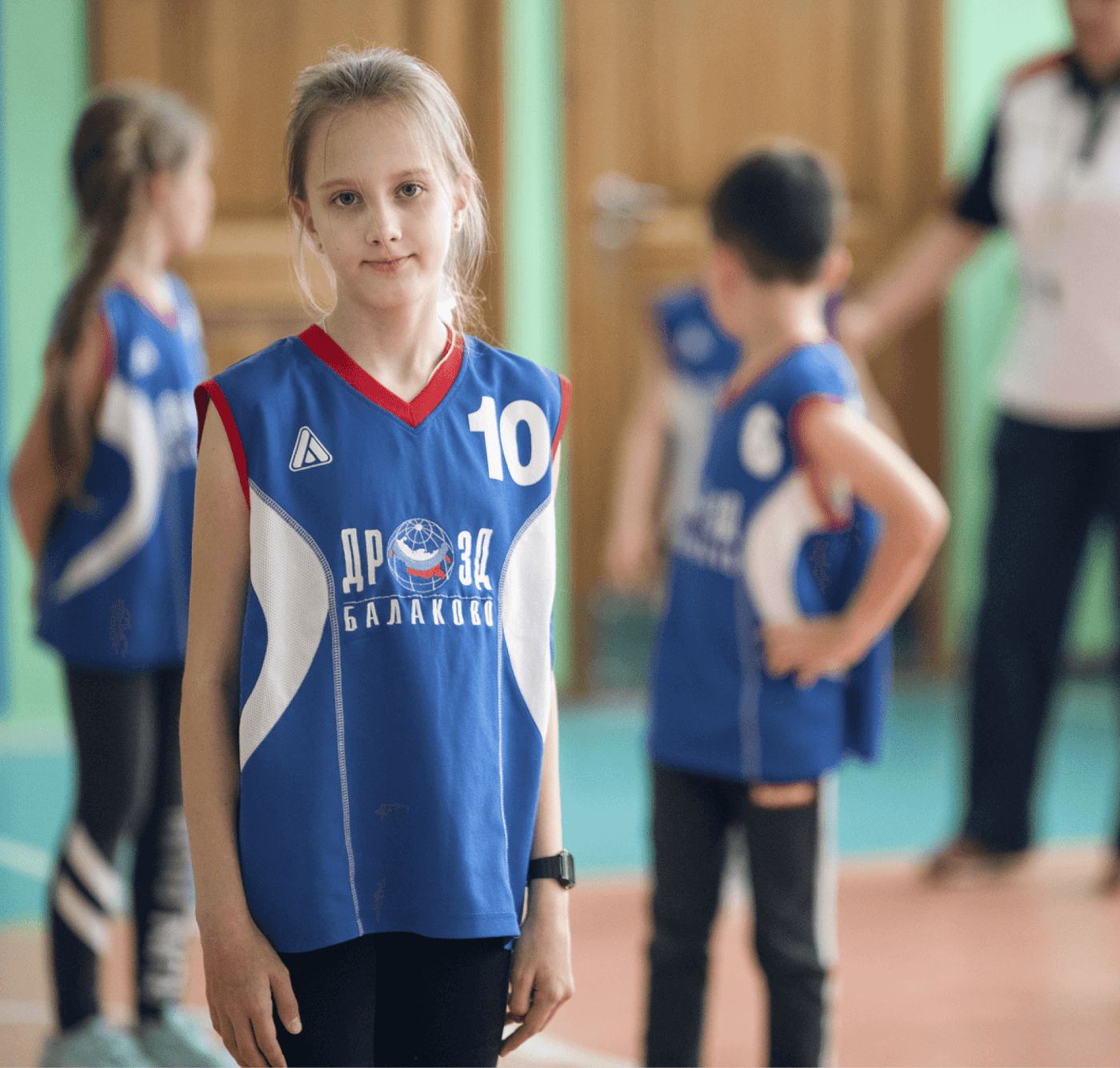
Independent organisations within DROZD currently serve 7,785 children, who practice 30 disciplines in 78 sports classes. Among them, over 170 children with disabilities also take part in the organisations’ programmes. In addition, DROZD has established 11 non‑sports hobby groups for popular science, patriotic and preliminary military training, fitness, Media School, robotics, etc. 2023 saw the participation in DROZD events rise to 55,487 individuals, a 39% increase from the previous year.
In 2023, funds raised accounted for 38.29% compared to the amount of funds from the founder, which indicates the popularity and great interest in the project not only from the region’s local communities, but also from the regional authorities.
To gauge the effectiveness of DROZD’s activities, an annual survey captures feedback from children and parents within each organisation, pinpointing strengths and weaknesses. The latest survey findings reveal a tremendous rise in positive parent feedback – from 84% to 90% – about the organisation of classes across the four regions where DROZD operates.

The main objective of the programme is to preserve and promote orthodox values, spiritual ideas, and respect for our legacy and motherland.
The programme has been underway since 2001 and is implemented in cooperation with the Russian Orthodox Church, regional and local government authorities, non‑governmental organisations and civil society.
In 2023, the Company extended support to the patriarchate, dioceses, and 40 churches in the regions of operation and other domestic and international locations, which included financial aid, coverage of repair works, and contributions of mineral fertilizers.
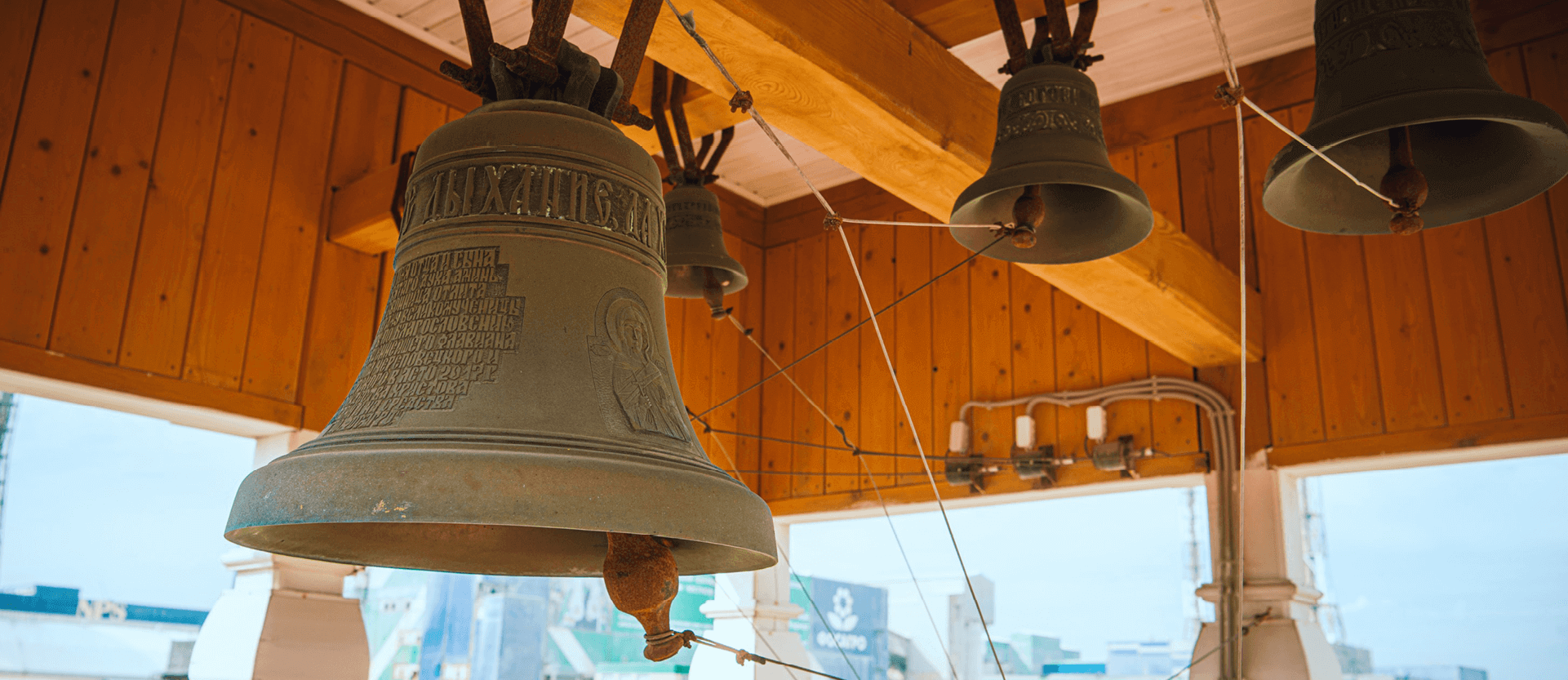
The main goal of the programme is to preserve memory of the history of the nation, industry, or facility for all generations; traditions of respect for the older generation, veterans, and vulnerable population groups.
Career Guidance and Exhibition Centres project
PhosAgro Group’s corporate interactive museums are integral to the vocational guidance programme targeting schoolchildren, students, and young professionals.
The Group’s interactive education centre combines the features of museums, exhibition venues, and interactive learning spaces, all situated within the cities that host the Company’s operations.
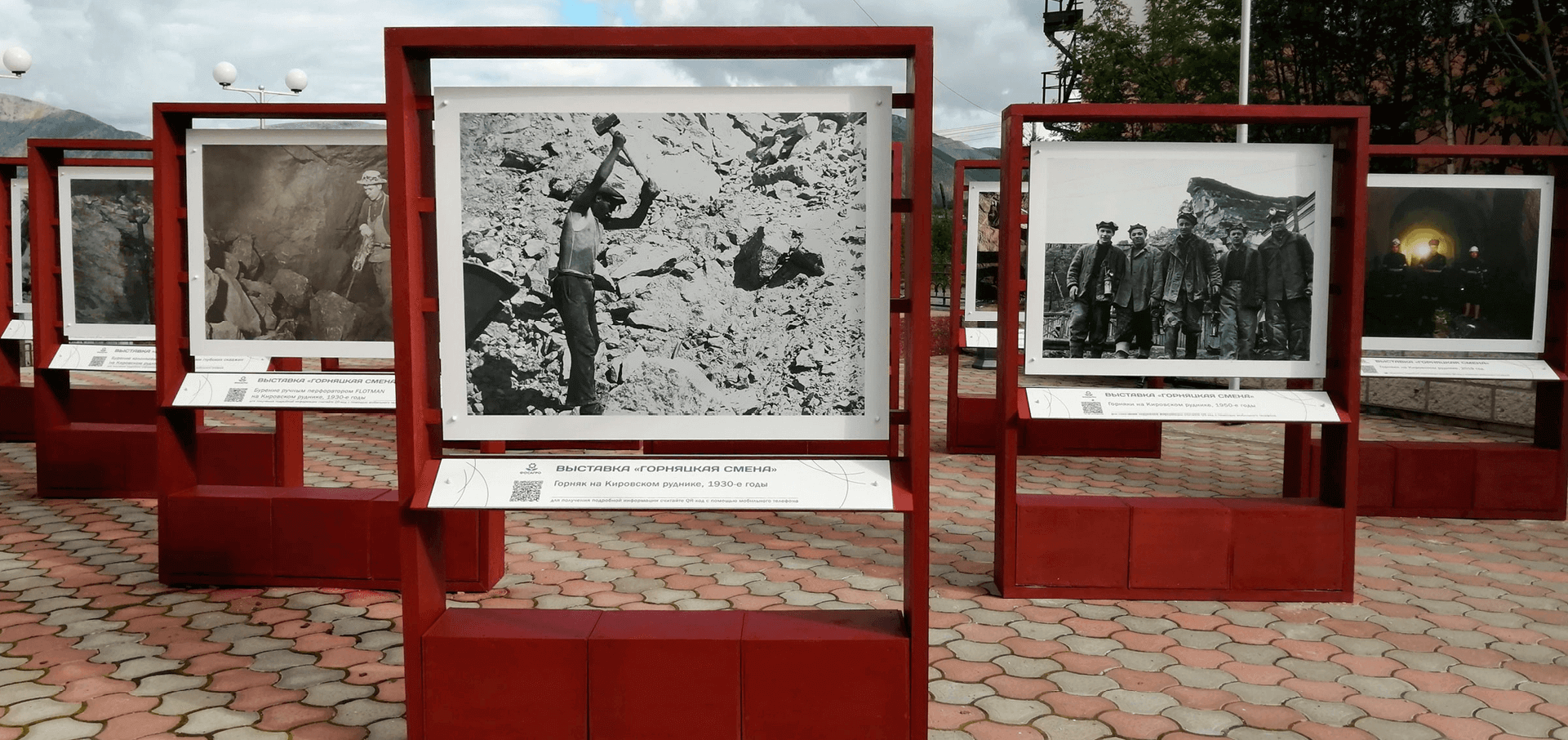
Participants:
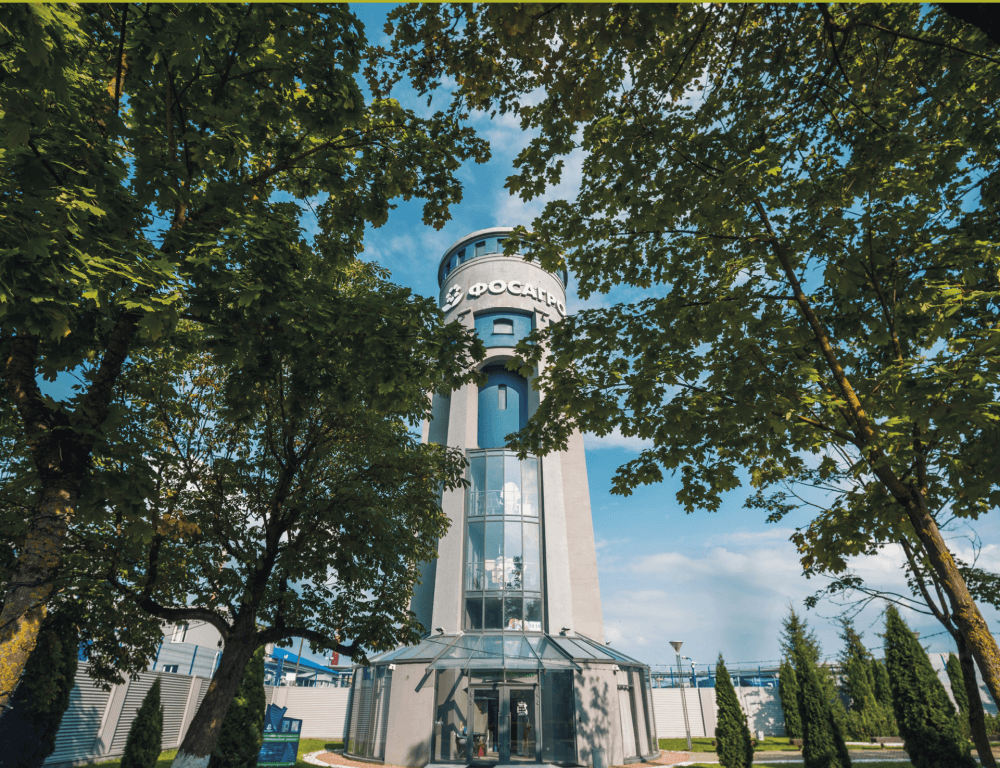
Fifteenth Element, a museum and exhibition centre and a centre for interactive learning in Volkhov

Green Planet, a centre for interactive education in Cherepovets
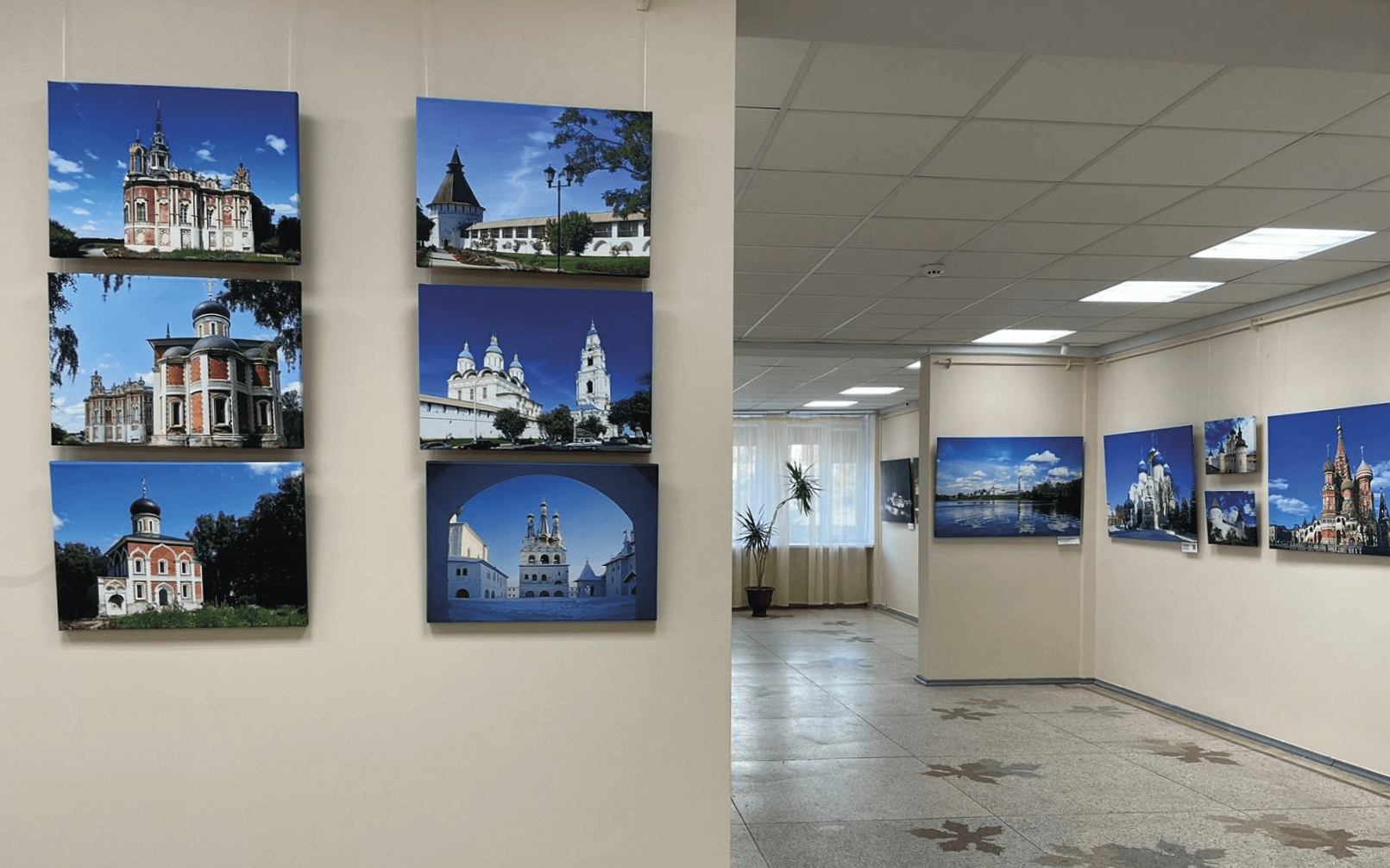
Academy of Fertility, a centre for interactive learning in Balakovo
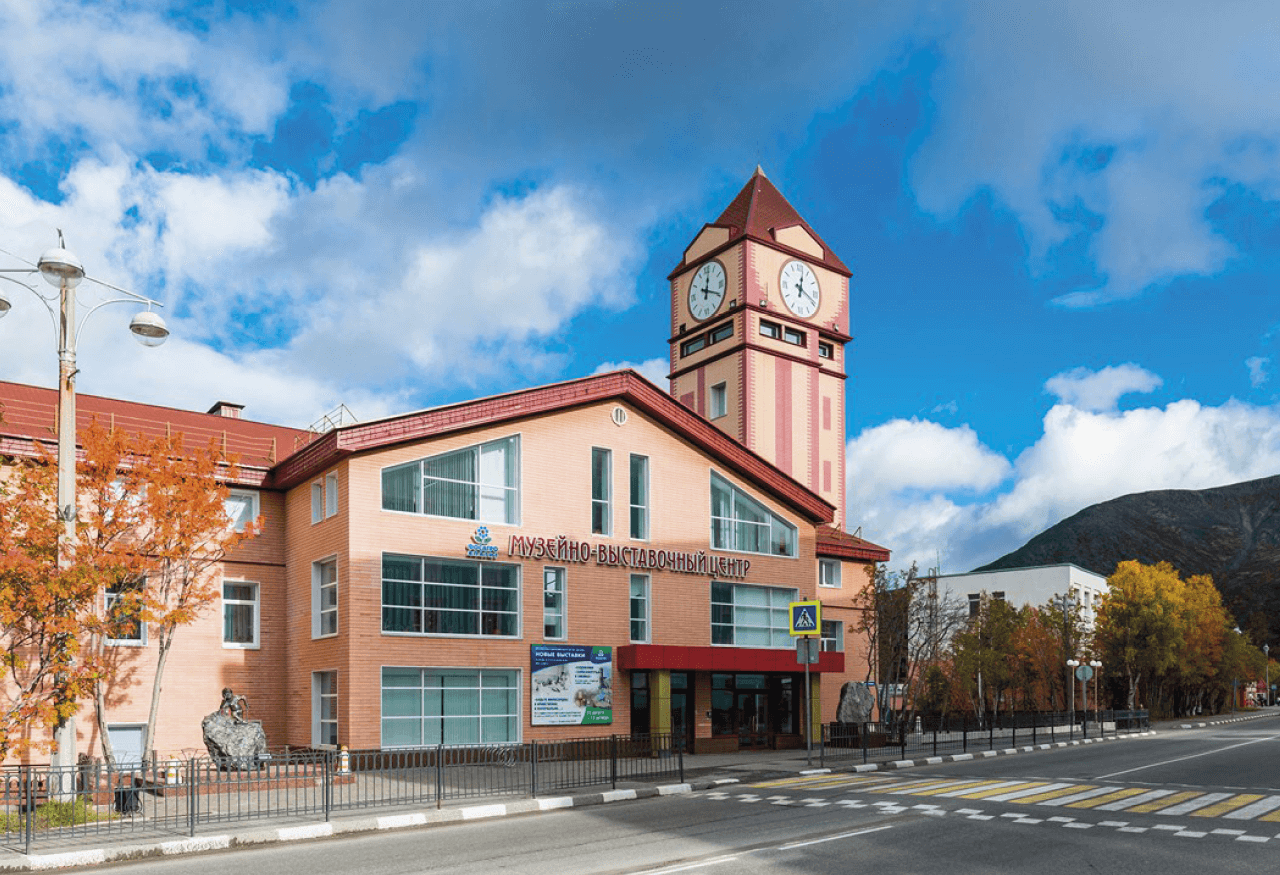
Museum and exhibition centre for interactive education of Apatit in Kirovsk
The centres boast permanent multimedia and interactive exhibitions on chemistry, geology, safety, and agrochemistry advancements. These hubs run educational programmes, hold chemical and geological workshops, creative master classes, scientific lectures, and vocational guidance assessments. The interactive education centres provide information about specialised educational programmes, such as Talent Pool, PhosAgro‑START, and PhosAgro Schools. Schoolchildren and students are invited to participate in a bespoke vocational guidance test and offered insights into professions in high demand at the Company’s facilities.
Awards won by museum and exhibition centres and centres for interactive learning
This project is aimed at promoting a responsible attitude towards safe behaviour and raising awareness in children, young people and their parents.
In 2023, PhosAgro continued a unique project for schoolchildren which was initiated by the Cherepovets facility and enlisted the support of Apatit’s Economic Security Department and the Ministry of Internal Affairs’ Office in Cherepovets.
It culminated in three grand finale Safety Territory festivals, which engaged over 250 school students and around 20 partner organisations contributing to the programme’s success. In 2023, the event expanded to an interregional scale, drawing involvement from teenagers across Cherepovets, St Petersburg, Arkhangelsk, and Vologda.
The project achieved the following results:
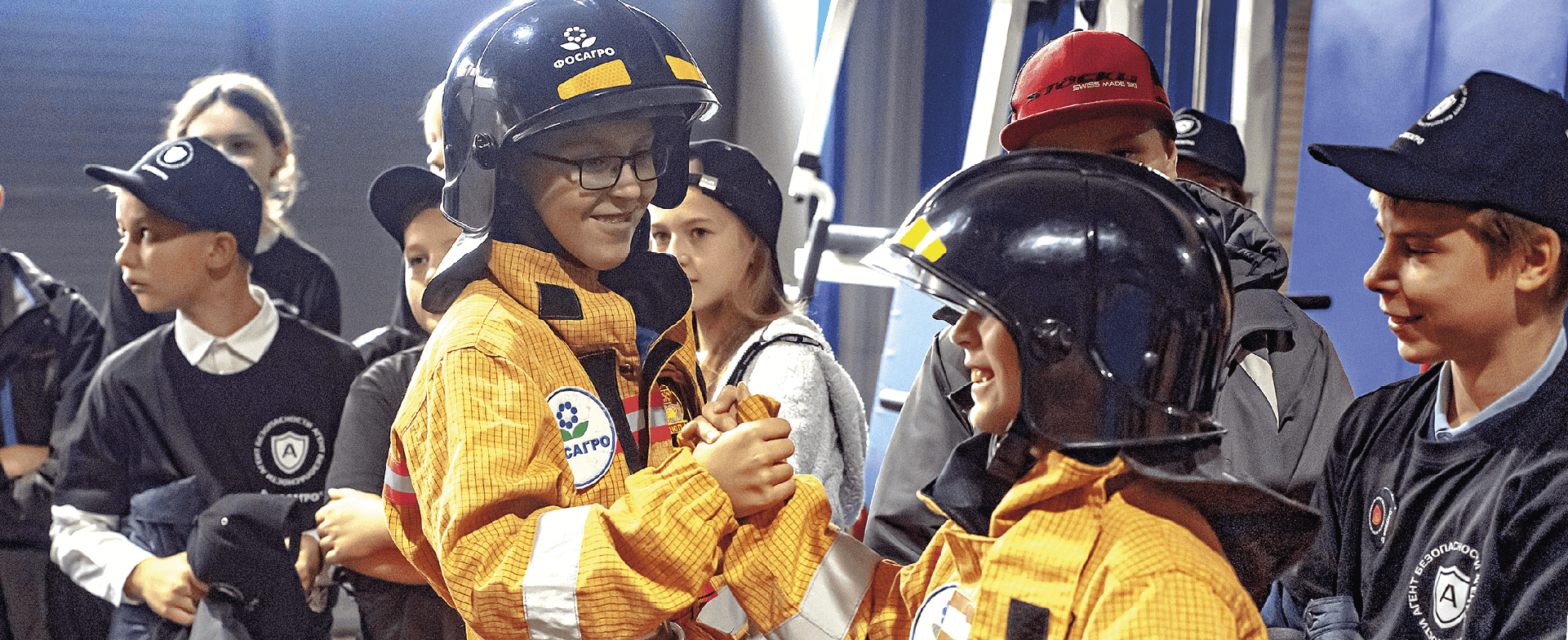
- winning the second‑degree diploma for The Kislov Family cartoon series in the Animated Films category of the Marvel of the World, a nationwide competition of tourist video presentations for individuals and teams;
- receiving the title of Laureate of the Prize of the Ministry of Internal Affairs of Russia – StGeorge in the social domain.
Targeted Assistance project
A combination of targeted assistance to public organisations and support for volunteer initiatives in the regions of operation.
More than 70 NGOs, organisations of veterans and disabled people, and charitable foundations received assistance from the Company in 2023.
In the Vologda region, PhosAgro Group backed 31 NGOs, including In the Name of Good charity foundation, women’s associations such as the Union of Cherepovets Women and Mothers of Cherepovets Recommend, as well as the regional organisation Future Exists, supporting families with disabled members. Specifically, In the Name of Good charity foundation (established by the Company) provided targeted aid for the treatment and rehabilitation of 127 disabled children. Moreover, 380 families participated in the foundation’s training sessions, lectures, and other activities.
In the Murmansk region, PhosAgro supported the creation of three volunteer centres (in Kirovsk and Apatity municipal districts) to offer leisure‑time activities to elderly people in remote communities. The Rodnik club assembled 16 social groups to foster both patriotic and creative pursuits, and offer dedicated activities for individuals with disabilities. The value of this initiative is underscored by a 19% rise in volunteer centre attendance by the elderly, a substantial increase from the previous year.
Support for Russian sports at the international, national and regional levels, and promoting sports in regions where the Group operates.
We believe that supporting the first steps of young athletes in the cities of our presence is just as important as contributing to the success of record holders.
Apart from DROZD, the Company provides assistance to 25 sports organisations at the federal, regional, and municipal levels. In 2023, total support amounted to nearly RUB 652 mln
PhosAgro’s support at the federal level went to:
- Russian Olympians Foundation:
- Russian Rhythmic Gymnastics Federation;
- Russian Cross‑Country Skiing Federation;
- Russian Chess Federation;
- Russian Rugby Federation;
- Moscow Rhythmic Gymnastics Federation;
The Company’s support at the regional level went to:
- Proton Volleyball Club (Saratov region);
- Avtodor Basketball Club (Saratov region);
- Turbina 2016 speedway team;
- Severyanka Volleyball Club (Vologda region);
- Kovrovets Motoball Club.

For more information on the opening of the Hockey School, visit the Murman TV and Radio website.
